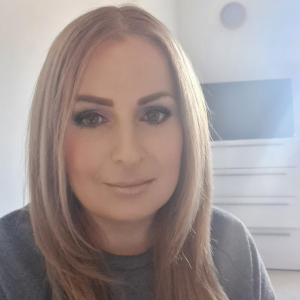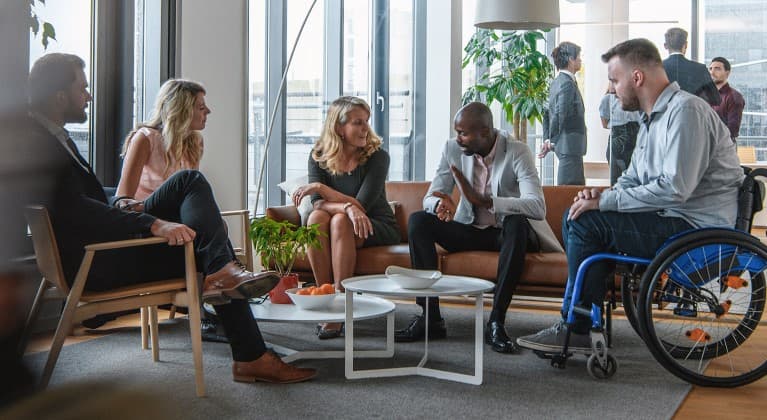Our purpose and strategy
Our purpose is Helping Britain Prosper.

As part of neurodiversity awareness week, accessibility advocate Heidi tells us about her experience of having autism, and about some of the ways that colleagues and Lloyds Banking Group have helped to support her at work.

I’ve always felt ‘different’. I remember feeling as a child that I didn’t really have an identity or a personality, I didn’t know how to act and nothing ever felt natural. A good analogy I read much later on in life explains it – it’s like being placed in the middle of a play without choosing to take part but not knowing the script or what the play is.
I scrambled around for years trying to copy others with their humour, dress sense, hobbies, even my handwriting. Every part of me was effectively copied from a multitude of sources. Despite trying my hardest to fit in, my life as a child never felt natural and I was severely bullied until I left school.
At the age of 16 I was too scared to go back into a learning environment, so I decided to start work. My mental health was very poor at that time, and I felt I needed to try out a ‘new me’ with people I’d never met before in order to feel accepted. I still felt like I had no idea what I was doing, but I felt far less stressed than I did at school.
I continued to experience significant challenges whilst at work. I struggled to hear some people and would mishear what they said. I couldn’t be in loud environments so things that my peers enjoyed, like going out to a nightclub or festival, would terrify me.
I also got in to trouble at work for having ‘no filter’. I couldn’t hide my emotions – I’ve always been very honest and I couldn’t understand why there would be instances where you were expected to lie, like out of politeness or so as not to offend people.
My emotional resilience has always been a challenge. I would struggle dealing with angry customers and either burst in to tears or verbally try and defend myself. I struggled paying attention to my work. Learning anything new felt impossible - I wasn’t absorbing new information and was constantly worn out.
I started working at Lloyds Banking Group in my late twenties and was amazed over the amount of colleague networks available. I gradually became involved in Inclusion and Diversity networks and followed the Group network for disabled colleagues – Access. At that point I was really struggling with work, particularly with hearing customers on the phone.
"Women with ADD/ADHD and Autism demonstrate very particular differences which are not often present in males, this can often lead to misdiagnosis. Because of this, I felt it was important to increase awareness of these conditions.”
I decided to go for a hearing test and was shocked to find out that, whilst I only had minimal hearing loss, I did have difficulties in processing certain frequencies. The audiologist suggested I had something called Central Auditory Processing Disorder, which is where your brain isn’t able to successfully process the sounds coming through the ear and the result is a scrambled version of what you actually heard.
Between the ages of 36 and 38 I was then diagnosed with several neurodiverse conditions (as well as physical conditions). None of these were ‘new’ - they were things I had since birth, but I had never been able to get a diagnosis through the NHS. It was only by utilising the Group’s resources such as the Access Network for disabled colleagues, the Workplace Adjustment Scheme and the private medical insurance that’s part of the colleague benefit package that I was able to get diagnosed.
Prior to my various diagnoses I had been at breaking point – emotionally, physically and mentally. I was struggling with so many things on a day to day basis, only to be told in the past that there was no identifiable cause. In a few years of working at Lloyds Banking Group I had been able to obtain clarity and was further diagnosed with Asperger’s Syndrome and Attention Deficit Disorder, along with several other non-neurominority conditions including ME, Fibromyalgia and an auto immune condition. The majority of these were diagnosed by utilising the healthcare benefit.
I signed up as an Access Representative at the start of my diagnosis journey as I wanted to support others who were struggling with their health conditions. Women with ADD/ADHD and Autism demonstrate very particular differences which are not often present in males, this can often lead to misdiagnosis. Because of this, I felt it was important to increase awareness of these conditions.
At the age of 36, there was a lot of anger and grief over the fact that I hadn’t been diagnosed as a child. I wondered what support I might have received and whether this would have resulted in me achieving more in life. Gradually, I was able to accept the diagnoses and actually become grateful for them. I realised that the traits I like in myself such as my persistence, compassion and strong moral compass are because of my neurodiversities.
Over the years I have utilised the Group’s Work Place Adjustment program and the Government Access to Work scheme to obtain physical and practical adjustments to help me continue working, such as Assistive Technology to help me read documents, assessment for another neurodiversity (Irlens Syndrome) as well as providing me with filters for my glasses. I have received several hours of coaching from Genius Within (a company who provide support services for neurominorities). I also attended the Personal Development Programme run by our Group Disability Programme which helped me emotionally and mentally.
My line manager has been exceptional throughout all of this, she has understood the challenges I face but also where my strengths lie. As a result, she has provided me with suitable opportunities to develop and also cater my role around my disabilities. At the same time, it has provided development for her as she has needed to take time to understand my needs and how to provide the correct level of support.
I can honestly say that if I had not received the level of support that I have, from both my line manager and through the Workplace Adjustment scheme, I would not be in a position to work. I can work flexible hours and now work from home full time which helps me manage my conditions.
The Access network has been great for moral support but also for providing me with opportunities to help others and also enabling me to overcome some of my fears. I have trained as an Accessibility Advocate and Mental Health Advocate, meaning I can raise awareness of mental and physical disabilities and champion colleagues. I have been able to deliver several training courses and influence senior management through our Neurodiversity Working Group.
My advice to others managing neurodiversity at Lloyds Banking Group would be to utilise all of the available support. We have an excellent Employee Assistance Program, support through the Bank Workers Charity, and private medical insurance as a free benefit. Completing a Work Place Adjustment passport will enable you to communicate your health requirements throughout your career journey.
Please be open and honest with your line manager – you may find that some small adjustments can make the world of difference. We have wonderful colleagues who either follow or regularly engage with the Access Network and we are lucky to have this supportive community.

Heidi has 19 years’ experience in financial services, with 10 years of those at Lloyds Banking Group. During this time, she has worked in three roles, starting in Business Intelligence and then Mortgage Fraud Controls. She has held her current role in Retail Fraud and Financial Crime for almost seven years with the core purpose of protecting our customers and the bank from fraud and financial crime whilst minimising the impact on genuine customers.
Heidi is an avid supporter of championing equality and supports the Group by advocating for colleagues with disabilities and long- term health conditions. She is also a trainer for the Accessibility Advocates program which aims to create an inclusive workplace for colleagues.
At Lloyds Banking Group, inclusion is central to our business success. We know that colleagues who can show up to work as themselves are those that can bring their best, and we are committed to supporting colleagues with a disability, including neurodiversity and mental health conditions.
Find out more about working at Lloyds Banking Group by visiting our Careers page, or search for available jobs here.

Fiona Cannon reflects on the first report from the FTSE Women Leaders Review, plus the Group’s journey to gender balance.
Fiona Cannon | 08 Mar 2022

We're changing financial services - and we want you to join us.
Lloyds Banking Group the UK's largest financial services group, with our 25 million customers and a history stretching back more than 300 years.
Popular topics you might be interested in